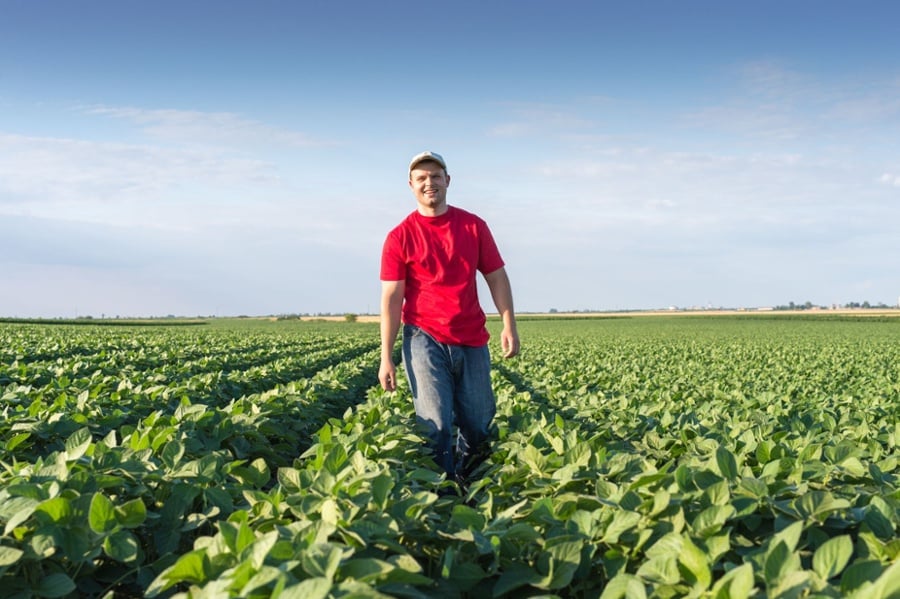
Learn our 10 actionable tips for navigating the agriculture recruiting process and hiring the right farm workers.
On a surface level, recruiting is simply about finding someone to do a job. Looking at the bigger picture, however, the recruiting process has a significant impact on your business’s long-term goals. It’s important to approach your recruitment efforts with this in mind, so the ‘someone’ you hire has a positive influence on your ag business as a whole.
Farm owners and managers often do not take this into consideration when hiring workers. With farm labor being so limited nowadays, it’s understandable why so many feel the need to go with the first option they find.
But in doing so, you could end up hiring someone that produces more problems than results.
Investing sufficient time and resources into the hiring process is key to effectively generating growth for your farm operation or agribusiness. We’ve put together a list of best practices to help set you up for a successful hiring cycle.
1. Understand Your Long-term Goals
Before posting your job opening, it is important to stop and make sure you have an understanding of your long-term goals for your operation. This allows you to determine the key qualities and skill level potential hires will need for the present and any future projects coming down the pipeline.
We recommend outlining exactly what you’d like to achieve over the course of this new employee’s first year or two. Then determine how your new employee will contribute to making this happen. By doing so, you can set realistic goals for the hiring process and clear expectations for the candidate’s responsibilities.
2. Reassess Your Needs
The hiring process is truly a valuable time to step back and evaluate the grand scheme of your operation.
While you might think you have a clear understanding of what the job entails, it’s best to start from scratch. First, create a list of the tasks and responsibilities you know the job requires. Then, determine if there are any tasks on your own to-do list that could be easily taught and passed off to the new employee. That way you can free up time for yourself and focus on more important objectives.
This is also an ideal time to consider the status of your current staff. Is someone due for a promotion or ready for more responsibility? Bringing on new farm workers presents a great opportunity to rethink your existing team and shift their workload to increase productivity and efficiency. Doing so will also keep your employees happy and improve your farm culture.
3. Outline Desired Qualities and Requirements
With a clear understanding of your business goals and needs, you can then determine the essential qualities, skills, and experience needed. We recommend first outlining the “must-haves”, or basic technical skills and knowledge a potential hire must possess to be successful in the role, before considering those “nice to have” qualities.
But don’t base your decision on technical skills alone. Depending on the responsibilities of the job, you’ll also want to list any soft skills that will help a candidate really thrive in the position.
Another area to consider is a candidate’s professional goals compared to the needs of your business. Where do they see themselves in 5 years, 10 years? Do you need farm workers for a one-off season or are you looking for someone that has intentions of growing with your business? Decide what makes sense for you and be sure your expectations are clear.
4. Survey Your Current Employees
Your current employees can offer an incredibly relevant perspective on what the job entails and what specific skills are required to do it well.
Unless you’re a super hands-on manager that works alongside your farm workers, it’s likely there are aspects of the open position you don’t know. Your employees will be able to fill in the blanks and point out any prudent requirements you’re overlooking.
5. Set Clear Expectations
Farming is a job unlike any other, and it can get stressful during peak seasons. You would be doing your farm workers a major disservice if you don’t set clear expectations from the start.
Make sure you’re completely transparent and straightforward about what the candidate’s daily responsibilities will be and how they will fluctuate throughout the year. Be extra clear about what they should expect for the especially busy weeks during the season.
This is where choosing a farm worker with previous experience really comes into play. If a candidate isn’t familiar with the lifestyle and isn’t prepared for the more intense work days, they might not be the right fit for the position.
6. Reevaluate the Existing Pay Rate for the Position
Prior to advertising your available position, it is imperative to do some research to learn what is considered a competitive pay rate within the ag industry. Be sure to know the local going rate for farm labor, and what benefits are being offered by other farms.
Keep in mind, however, that the agriculture industry is a little behind in regard to setting competitive wages. It’s important to note that the same job in other similar industries offers higher starting pay rates. For this reason, don’t limit your research to the ag industry only.
Setting the right pay rate is critical in hiring reliable farm workers. By doing the research and learning the pay rates your competition offers, you can set a realistic hourly wage or starting salary that will attract the right candidates.
To learn more on how to set a competitive pay rate, check out our Ultimate Guide to Keeping Your Pay Competitive to Attract and Retain Employees.
7. Advertise the Job Properly
In this digital age, relying on word of mouth alone isn’t going to help you hire great farm labor. Utilize social media and niche job boards to reach more candidates with the right experience.
Attracting the right farm labor to your openings starts with writing an effective job description. Be sure your job posting clearly outlines the job responsibilities, required skills, benefits, and your company culture.
8. Consider Training on the Job
Sometimes the right farm workers are not who you would expect. Sure, years of hyper-relevant experience is a valuable quality to look out for, but don’t be too narrow-minded in your search that you overlook high-quality candidates because they lack experience.
Candidates may have other work experience that requires the same resilient work ethic and physical competency as farm work. All they need is a little bit of training.
In this case, it’s important to consider what skills can be taught on the job. Decide whether or not you have the time and resources to develop a candidate in these skills.
Learn more about hiring outside of the agriculture industry.
9. Ask the Right Questions
When you reach the point of interviewing potential farm workers, you’ll want to be prepared with the right questions. Before meeting with a candidate, create a list of questions that you know will help you determine if a candidate is right for the job.
If you conducted a thorough pre-screening, the candidates should possess a certain level of skill and knowledge. This means you shouldn’t have to spend too much time asking technical questions during the interview. Instead, you can focus more on questions that will speak to their communication skills, problem-solving skills, past work experience, ability to work on a team, and professional goals.
Be sure to avoid any discriminatory or illegal questions!
10. Ask for Referrals
Never underestimate the power of referrals, especially in an industry like agriculture. Reaching out to friends and colleagues can often point you in the right direction. You never know who might have an awesome recommendation! Plus, they’ll likely be able to vouch for the candidate and speak to any traits the person possesses that will be relevant to the role.
Sometimes, your current employees can be the best source of referrals. High performers tend to surround themselves with other high performers. Be sure to inform your team when a new opening becomes available and encourage referrals.
Learn more about maximizing employee referrals in your recruitment strategy.
Partner with AgHires
Hiring the right farm labor doesn’t have to feel overwhelming. With a thoughtful strategy, clear expectations, and a steady focus on long-term success, you can build a team that keeps your operation running smoothly season after season. And if you’d
rather have a partner take the task of recruitment off your plate, AgHires is here to support you.
Whether you’re looking for dependable farm labor, skilled operators, farm managers, agronomists, or any other ag professionals, our team can manage the entire hiring process from start to finish. We help you attract stronger candidates, save valuable time, and make confident hiring decisions, so you can stay focused on what you do best.
Discover the AgHires difference and contact us to learn more about how we can help you find your next great hire. For more hiring advice, visit our resource library.







